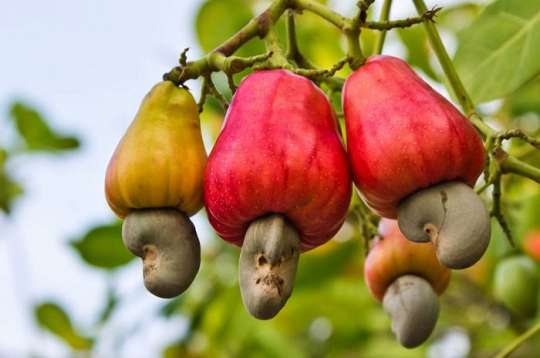
The cashew nut industry is booming but many African countries are missing out on its valuable economic opportunities.
In 1991, Ghana exported 15 metric tonnes of cashews. By 1997, the country’s cashew exports had increased to 3,571 metric tonnes. In 2002, the exports rose to 3,893 metric tonnes, valued at US$1,450,306.
According to the 2017/18 Ghana Census of Agriculture, cashew is one of the few cash crops in Ghana that is cultivated by medium and large-scale farmers. The census also revealed that only 14% of cashew nut farmers in Ghana are smallholders with less than two acres.
According to the Ministry of Food and Agriculture (MOFA), as of 2018, over 220,000 hectares of land in Ghana were under cashew cultivation. Like almost every cash crop, the number of rural cashew farmers in Ghana is higher than urban ones. 60 per cent of Ghanaians practice rural cashew farming while 40 per cent practice urban cashew farming.
In 2020, Cote d’Ivoire and Ghana were the leading exporters of cashew nuts in Africa, both shelled and unshelled.
The export value of cashew nuts from Ghana was approximately 300 million US dollars in 2022, marking another record high despite a decrease from the previous year. The most significant increase occurred between 2016 and 2017, when the export value rose from about 230 million US dollars to around 390 million US dollars.
While the cashew nut industry is thriving, many African countries are missing out on the valuable economic opportunities it presents. Emerging developing countries like Ghana and Burkina Faso have started processing their cashew nuts and selling them to various global markets.
To be able to take advantage of existing opportunities and ensure that Ghana’s agricultural diversification programme achieve the desired goal the Government in 2019 set up the Tree Crops Development Authority (TCDA).
It is a body established by an Act of Parliament, the Tree Crops Development Authority Act 2019 (Act 1010,2019) to regulate and develop in a sustainable environment; production, processing, and trading of six tree crops: Cashew, Shea, Mango, Coconut, rubber, and oil palm in Ghana.
In line with its mandate and to boost the development of the business, the Authority hosted the 6th Council of Ministers Meeting and Experts Meeting of the Consultative International Cashew Council (CICC) in Accra.
The event that took place from April 18 to 20, 2024, emphasised critical objectives for advancing the cashew sector, including value addition, research initiatives, productivity enhancement, technology integration, and human capital development.
Also, in acknowledging the substantial contribution of the cashew industry to Ghana’s economy, with export revenues reaching approximately $300 million in 2023, the government recognised the importance of collaborative partnerships – involving the private sector and esteemed development partners such as GIZ/MOVE, the EU, the African Cashew Alliance (ACA), Olam Foods Ingredients, Procashew, and Prosper Cashew.
To eliminate unscrupulous buyers from the system and encourage the farmers to produce more, the Authority is the sole agency that computes and arrives at prices of cashew in consultation with relevant actors and stakeholders within the cashew value chain.
Like any other agricultural venture, economy of scale is very crucial. If the farm is large, the rate of return would be expected to be better. Since the economic yield of the crop starts from the third to fourth year onwards, it could be inferred from the results that intercropping with maize would provide income to poor farmers.
The demand for nuts is increasing daily, but the supply is limited. Can Ghanaian farmers rise up to the occasion? Can cashew outpace cocoa in the foreseeable future? Will bureaucracy and officialdom allow the cashew industry the chance to grow and develop as expected?
The Tree Crops Development Authority (TCDA) has the mission of facilitating the development and well-being of selected tree crop industries through research, capacity building, and excellent services. The aim is to achieve long-term commercial productivity and sustainability while providing a higher contribution to the national economy of Ghana. The TCDA is poised to overcome any challenges that come its way.
On paper, the TCDA appears to be the ultimate solution for all the challenges in the cashew industry, but only time will reveal its true impact.
Story: Oppong Baah







